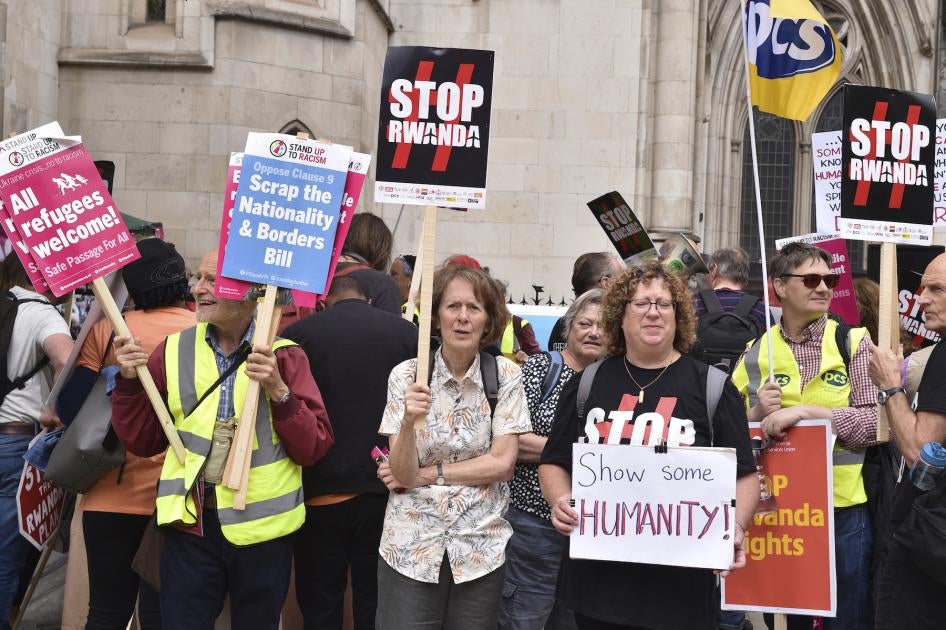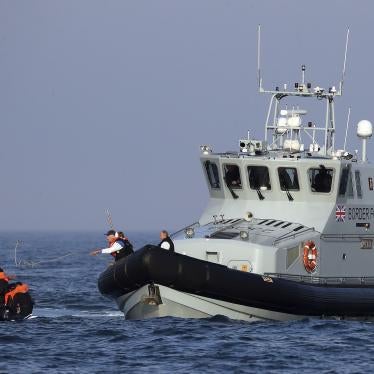The United Kingdom introduced the Illegal Migration Bill into parliament on March 7 that would prevent anyone who arrives to the UK irregularly and has travelled through other countries first from being able to claim asylum or access modern slavery or trafficking protections in the UK.
If the bill is passed, people will be automatically detained, including families with children and unaccompanied children, for at least 28 days with no right of appeal, pending removal to their home country if it is a safe country of origin or to a “safe third country” listed in the bill. Those removed from the UK will be banned from returning or gaining British citizenship, except in very limited circumstances.
The United Nations refugee agency, UNHCR, on March 7 described the bill as an “asylum ban,” extinguishing the right to seek protection in the UK for those arriving irregularly, regardless of how genuine and compelling their claim may be.
The UK’s latest move to punish people based solely on how they reached the UK bears striking parallels to Australia’s longstanding abusive and deadly externalization and deterrence policies, as others have begun to highlight.
Yet, this global race to the bottom amongst wealthy governments in the Global North is nothing new. For many years, countries – in particular Australia and the United States – have been exporting their cruel and unlawful policies to one another. These policies include the militarization of borders, criminalization of migration, and removal of people to third countries known to be unsafe and to pose a risk of chain refoulement for asylum seekers – that is, returning them to a place where they would be at risk of persecution or other serious harms. These individuals were already unable to receive effective protection in countries they travelled through.
It is thus unsurprising that the UK is again taking inspiration from Australia, which extends well beyond the “tough on borders” rhetoric and three-word slogans of the Australian government now being echoed by the UK government.
Australia’s Inhumane Refugee Policies
In 2001, the Tampa incident occurred, when the Australian government refused to let the MV Tampa, a Norwegian ship that had rescued 433 people from a sinking ship, into Australia. In response, Australia began turning boats back at sea and introduced “offshore processing” – the forcible transfer of people to another country to have their refugee claims processed.
In what is often called the “Pacific Solution”, the Australian government created a legal fiction to avoid its international obligations, passing laws “excising” certain outlying territories from the Australian “migration zone” and preventing anyone who reached these excised places from claiming asylum in Australia. Instead, those intercepted would be transferred to Manus Island in Papua New Guinea (PNG) or Nauru for refugee status determination, confined in camps run by the International Organisation for Migration, and had to apply to Australia or a third country for resettlement.
The program ended in 2008. But since mid-2013, after the government reintroduced offshore processing on Nauru and PNG in 2012, any asylum seeker who arrived by boat was subject not only to mandatory offshore detention, but banned from ever permanently settling in Australia, even if recognized as a refugee. The conditions for those detained offshore worsened significantly. Mandatory immigration detention had already been in place for those arriving without a valid visa since 1992.
Most of the 4,000 people sent to the remote islands have either been resettled to a third country or returned to their country of origin. A deal to relocate refugees to Cambodia failed and was widely criticised. Ten years, later about 140 people remain in Nauru and PNG, living in the community and stuck in limbo.
At the same time, the Australian government established Operation Sovereign Borders, a military-led operation designed to “stop the boats.” It involves boats being intercepted and turned back to the country they left and aims to prevent those who come by boat from entering and ever settling in Australia.
In building its asylum and border policy around mandatory immigration detention, turning back boats at sea and offshore processing, Australia has caused immeasurable suffering for thousands of vulnerable men, women and children and long been condemned, including by the United Nations and the prosecutor of the International Criminal Court.
This is what Abbas Maghames, an Arab Iranian asylum seeker detained offshore by Australia on Nauru with his family for six years, had to say to Human Rights Watch in 2021:
“Please. We need to get out from detention. It’s been almost nine years I’ve been in limbo. Everyday I’m suffering. My mental health is getting so worse. This is not a correct solution. Australia doesn’t treat me like a human. It’s not right to treat anyone like this. Every night I have nightmares. We live with stress and depression every single day. We are so suffering. We are so tired.”
UK Following Suit
Over the last several years, the UK has doubled down its efforts to externalize its protection responsibilities and circumvent its legal obligations owed to people arriving at UK shores, mirroring measures introduced in Australia.
In April 2022, the UK passed the Nationality and Borders Act, which empowers the UK to push back boats in the English Channel and remove asylum seekers to a so-called safe third country, criminalizes seeking asylum, and affords refugees lesser rights based solely on how they arrived in the UK. The government ended up withdrawing their pushbacks policy in response to legal challenges before the bill was passed.
The limited transfer of people to a country that is safe and with which they have a close connection may be lawful. However, in sending people to Nauru and PNG, Australia manipulated the concept of a safe third country, removing asylum seekers to places they had never transited through. Similarly, the UK is planning to send asylum seekers thousands of miles away to Rwanda, a place most will have never set foot in. In April 2022, the UK concluded a Memorandum of Understanding with Rwanda to send asylum seekers who arrived irregularly there.
As with the second iteration of Australia’s offshore detention regime, people sent to Rwanda will never be resettled in the UK – they will be processed under Rwanda’s asylum system and, if recognized as refugees, granted refugee status there. No asylum seekers have been sent to Rwanda yet as the agreement is facing legal challenge.
It is well-known that very few safe third country arrangements provide effective protection and that governments remain responsible for any harm suffered by those they have forcibly removed. These arrangements reflect the broader trend of wealthy countries foisting their asylum responsibilities onto other countries, often those with poor rights records and reliant on development aid.
The severe abuse, inhumane treatment and neglect of those sent to Nauru and PNG has been extensively documented. Similarly, Human Rights Watch and the UNHCR have concluded that Rwanda should not be considered a safe third country to send asylum seekers to. The UK currently only has a formal safe third country agreement with Rwanda.
And now, the UK’s latest proposal will likely see hundreds of thousands of people unable to access protection and banned from ever settling in the UK, mirroring Australia’s ban. The government is hoping to pass the bill before summer recess in July and given the Conservative’s strong majority in the House of Commons it is likely to pass.
Rather than taking account of the grave harms caused by such policies, the UK continues unabated with measures that will have the same devastating human cost. The UK and other governments should uphold everyone’s right to seek and enjoy asylum, and move away from their cruel and unlawful externalization and deterrence policies. They should create humane and rights-respecting asylum and border policies that guarantee safe pathways and treat all people on the move with dignity.










